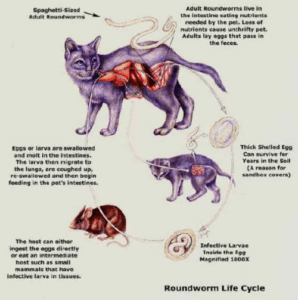Many cats and dogs are affected by intestinal parasitism, which can either be intestinal worms or protozoal organisms.
Most pets show symptoms such as diarrhea or soft stool, but in some cases older animals may not show signs at all. Fecal floatation done in-house at your veterinarian’s practice or sent out to your veterinarian’s reference lab is how parasitic infection is identified.
In some instances, when worms are not sheeding and protozoa are not forming cysts that are shed, a fecal float may be read as negative when, in fact, your animal companion is infected. In these cases empiric deworming is appropriate.
For the myriad of parasites out there, the isn’t one dewormer that does them all. There are some that are broader in spectrum tan others and therefore slightly costlier.
Common parasites found include:
-Roundworms
-Hookworms
-Whipworms
-Tapeworms
-Coccidia
-Giardia
Annual fecal floats should be performed to screen for possible infection. And if your companion is showing signs such as soft stool, diarrhea, weight loss despite eating well, you should consult with your veterinarian.
Intestinal Parasitism Treatment in Houston Heights
Urban Animal offers comprehensive services to help diagnose and treat your pet’s gastrointestinal symptoms. If your pet is showing signs of infection, call us with questions or to schedule an appointment.



